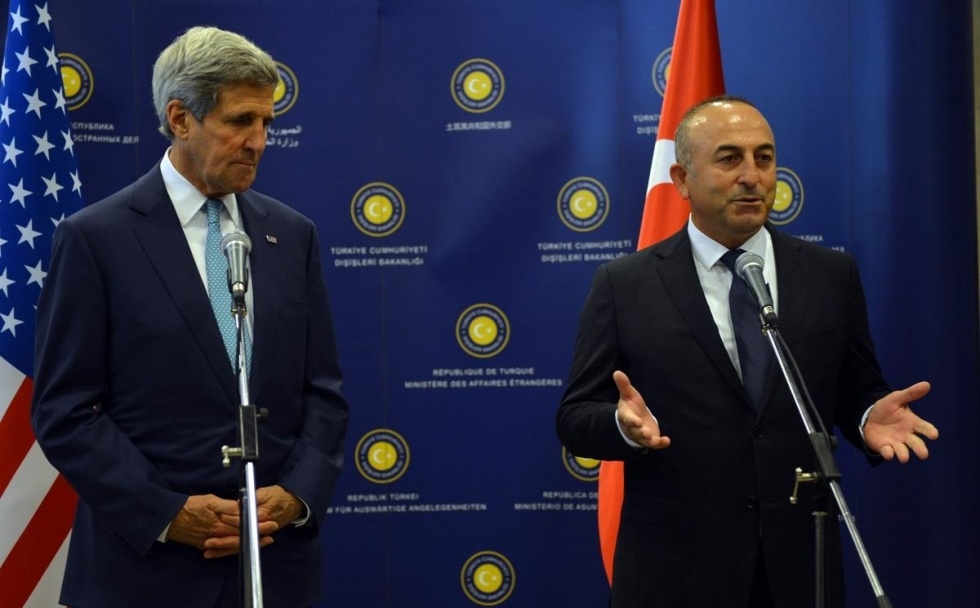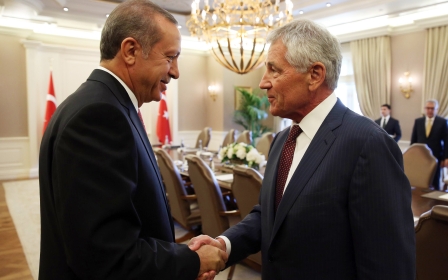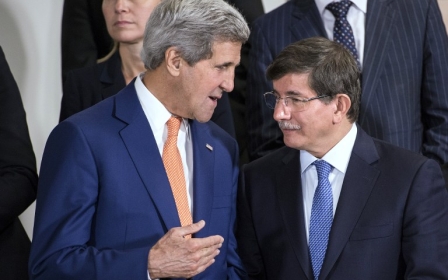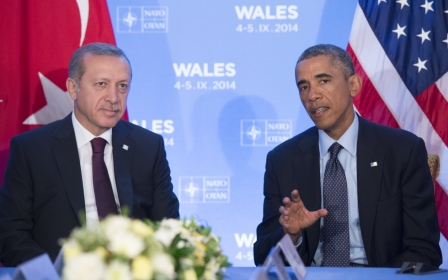Turkey refuses collaboration with US against IS

Less than 24 hours after Turkey’s decision not to sign up for the US-led coalition against the Islamic State (IS) at the Jeddah conference on Thursday, US Secretary of State, John Kerry and Turkish President, Recep Tayyip Erdogan, were photographed together in Ankara.
After a two-and-a-half hour meeting, the pair emerged to announce that they had decided to cooperate “against all terrorist movements in the region,” rather than just against IS.
The announcement, which was brief and contained almost no details, was a signal that Turkey and America will not permit an open rift over Turkey’s reluctance to join the US-led coalition. Instead, Turkey and the US will continue to help the Syrian opposition and to share intelligence. Neither of these developments should come as a surprise.
The compromise is considerably less than the US had hoped for at the beginning of the week. Thursday’s conference of Arab nations and the United States in Jeddah marked the point when it became clear that Turkey - even though it is the only NATO member in the region - would not be a full member of the coalition. For some observers the realization brought home claims made earlier this week by Congresswoman Ileana Ros-Lehtinen that Turkey and Qatar were neither definite friends nor enemies, but ‘frenemies’.
The Turkish delegation seems to have had the package of US military measures unveiled to them in Jeddah. But when Turkey’s foreign minister, Mevlut Cavusoglu, phoned home for further instructions, he was told not to sign.
Cavusoglu then flew back to Ankara to prepare for a round of meetings with Kerry the following day.
The decision not to join up with the US delighted several pro-ruling Justice and Development Party (AKP) newspapers, as well as other parts of the Turkish so-called Islamist press that disapprove of US President Barack Obama’s plans for an alliance.
The right-wing media seemingly backed the rejection, not so much out of a desire to protect IS, but in order to scale down US-Turkish cooperation and prevent Turkey from appearing subordinate to the US in the region.
Turkey’s present political establishment - until very recently - viewed all radical Sunni movements in Syria and Iraq as relatively benign forces. If they were in Iraq then they were seen as allies against the Shiite Maliki government in Baghdad, and if they were in Syria, then they were viewed as active combatants helping to bring down the government of Bashar al-Assad.
But developments on the ground are forcing a belated reappraisal and acceptance that there will have to be a partnership with the Americans on some issues. That is why Kerry is being offered something, though much less than he was asking for on Thursday in Jeddah.
Sabah, a newspaper close to the Erdogan government outlined what it says is the “partial support” that Turkey will give the US-led coalition; humanitarian assistance, intelligence, and border security.
On the face of it, this package adds little or nothing particularly new. Work is already well underway in all three areas. Turkey is a refuge for around one million Syrian refugees and it now recognises that it needs to prepare its borders against possible incursions from IS-occupied areas. Turkish forces are also doing what they can to make the highly porous frontier between Syria and Turkey and between Turkey and Iraq more secure, although with a border stretching more than 820 km with Syria and 350-km border with Iraq this is an extremely difficult task.
Quite apart from a sense of comradery with Sunni activists in Syria and Iraq, Turkey’s hands are also tied by another issue that hung over the talks.
As long as 49 Turkish hostages, diplomats, family and staff from the consulate-general, are being held in Mosul by IS, Turkey cannot take strong moves against the militants without endangering the lives of the captives.
While this consideration was not been openly stated, it was brought up immediately by Turkish officials, who began discussing the problem immediately after their country failed to sign the Jeddah communiqué on Thursday.
There is little controversy about this policy in Turkey, because press discussion of the hostage issue has been banned. But on Thursday, Sinan Ogan, a member of parliament for the far-right Nationalist Action Party broke the silence, claiming that the Turkish government - which seemed to be in telephone contact with the hostages in the early weeks of their captivity - had now lost contact and feared that they may have been moved to Syria.
Whatever the truth behind the claims may be, Turkey - having failed to act decisively when the hostages were taken - is now in an impossible position.
The government cannot risk the political catastrophe that would follow if anything happened to the prisoners and so it cannot challenge IS openly.
At the same time, however, the Turkish government cannot allow its hands to be tied indefinitely by IS. Southeastern Turkey, and indeed the country as a whole, are increasingly affected by the rise of IS; trade with northern Iraq has plummeted; jihadi movements are growing throughout the region, partly as a result of the influx of refugees; Kurdish public opinion is outraged; and a stream of young men have been leaving to fight against IS.
To a growing number of observers, cross-border movements by militants and other fighters in southeastern Turkey may be becoming uncomfortably reminiscent of the Afghan-Pakistani frontier conditions. Even in Istanbul, pockets of support for IS are appearing, and the government has been slow to deal with them. In the last few days of August, it was a Kurdish PKK group, not the authorities, that broke up an IS cell in Istanbul’s Basaksehir district.
The incident was an unexpected illustration of the way that the Kurds are stealing a march politically on the Turkish authorities at home and abroad because of their slowness to act over IS. If this trend continues Erbil, rather than Ankara, could become a focus of international action against IS.
We may already be seeing signs of this shift. While Kerry was in Ankara on Friday trying to persuade the Turkish government to work with the coalition, the French president Francois Hollande, the and a UN undersecretary, flew into Erbil for consultations with the Kurdish Regional Government.
Though Turkey has good working relations with the Kurdish Regional Government and is its main trading partner, it is effectively losing international influence to what it sees as a junior neighbour.
It is possible that Turkey is clandestinely providing more support to the anti-IS alliance than it openly admits. Indeed, there are claims that US drones from Incirlik air-base are taking part in strikes on Iraq, but there has so far been no confirmation of this and if Kerry has extracted assistance of this sort, there was no hint of it today. Instead, for the time being, the US and Turkey seem mainly to have agreed to paper over the cracks in a difficult relationship.
- David Barchard has worked in Turkey as a journalist, consultant, and university teacher. He writes regularly on Turkish society, politics, and history, and is currently finishing a book on the Ottoman Empire in the 19th century.
The views expressed in this article belong to the author and do not necessarily reflect the editorial policy of Middle East Eye.
Photo credit: US Secretary of State John Kerry and Turkish Foreign Minister Mevlut Cavusoglu on 12 September 2014 (AA)
New MEE newsletter: Jerusalem Dispatch
Sign up to get the latest insights and analysis on Israel-Palestine, alongside Turkey Unpacked and other MEE newsletters
Middle East Eye delivers independent and unrivalled coverage and analysis of the Middle East, North Africa and beyond. To learn more about republishing this content and the associated fees, please fill out this form. More about MEE can be found here.





